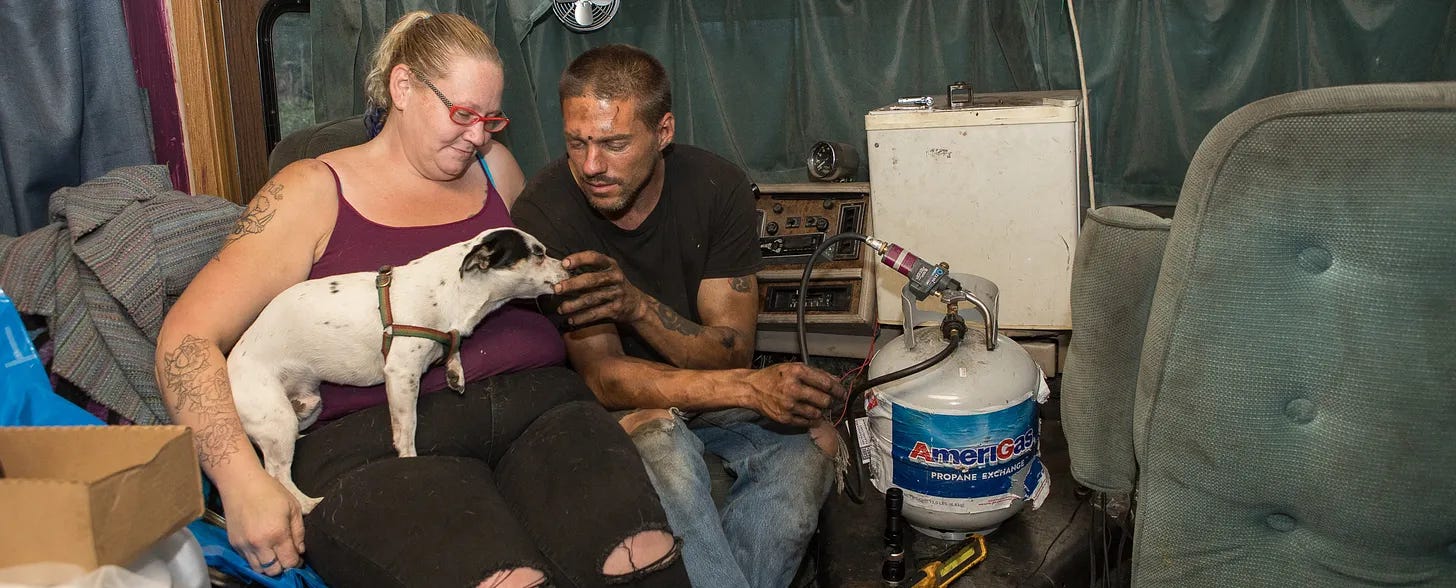King Chaos, Queen Cricket and One Long, Strange Year in a Roadside Homeless Camp
At this lawless encampment of rickety RVs, residents face eviction, addiction and machete battles, but their self-made community is the only thing they have.
The moment Cricket’s life flips upside down begins with a spark, and a gasoline generator. She is lying on her bed, playing with her cell phone in the 1991 Allegro Bay mobile home she shares with her boyfriend, Chaos. The lights go on. Then she hears him scream, “No! No! No!” She jumps up, looks outside and sees fire.
It’s 10:30 p.m. on October 18, 2020. The mercury has fallen, bringing new hardships for everybody living in Cricket’s community — three dozen rickety mobile homes perched along a busy arterial bordering the airport in Portland, Oregon.
“I’m coming, I’m getting water, I’m getting water!” Cricket yells as flames engulf the machine’s lidless gas tank, in an exterior compartment of the R.V. The couple has several vehicles that they park there, including another R.V., a GMC Yukon, a Ford F-150, a Toyota Camry and a Corolla, and a boat. “Let’s pull the generator out so we can save our home!”
She tries but can’t budge it. Chaos grabs the generator, and Cricket hurries to get out of the way. But, she recalls later, “I wasn’t fast enough and it splashed the burning gas all up on me.”
Things blur. After running for a moment, she stops, drops and rolls, then rips her pants off. Chaos pats out the flames. Someone pours water on her. In an effort to save the R.V. and their Chihuahua, Buddy, Chaos gets back in and drives away from the flaming pavement. The blazing generator, still attached, bounces alongside.
Again and again, Cricket screams, “I need to go to the hospital!” The pain is excruciating. “I was told I looked evil, like the devil,” she says.
Cricket and Chaos roar off in their Camry toward a hospital, but they miss a turn and skid up an embankment. “He backed it up off the hill, and then we realized the car was going donk-donk-donk,” Cricket recalls. They call 911. Finally — mercifully — an ambulance finds them. But the paramedics won’t let Chaos ride along.
Just like that, the pair are separated. Because of the ongoing coronavirus pandemic, he can’t visit her in the hospital. Except for a stint when Chaos was in jail, Cricket says, it’s the longest the two have been apart in their five years together.
It will trigger what she now calls the biggest change of her life. She never would have seen it coming six months earlier, when the pair arrived at the place residents simply call “33rd.”
Keep reading with a 7-day free trial
Subscribe to Narratively to keep reading this post and get 7 days of free access to the full post archives.




